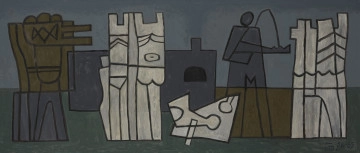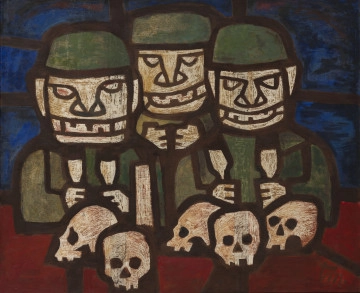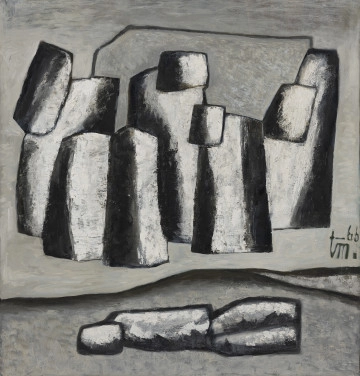
untitled
między 1958 — 1965
National Museum in Szczecin
Part of the collection: European classics of modernity
Moscow-born Marian Tomaszewski (1904-1968) began his education in a Russian gymnasium but moved to Poland with his parents after the October Revolution. He passed his baccalaureate examinations at the Juliusz Słowacki State Teachers' Seminary in Lublin (1926). It enabled the future painter to find employment in the educational sector, in which he was active almost his entire professional life. After receiving his diploma from the Warsaw Academy of Fine Arts, he began teaching the art of drawing in the capital city's secondary schools. During the Nazi occupation, the artist returned to Lublin, where he became an instructor at the art courses of Janina Miłosiowa (1896-1983) and subsequently at the German School of Painting and Drawing. Alongside his teaching career, Tomaszewski was involved in underground cultural life. After the liberation of the city, he created the foundations of an institution with the Provisional Board of the Trade Union of Visual Artists, of which he became president. His experiences in Lublin led him to be entrusted with organising artistic life in Szczecin, where he arrived in September 1945. At the Provincial Department of Culture and the Arts, he was a specialist in the arts; at the local branch of the ZZAP - he was a vice president; he also founded the Society for the Promotion of Culture in Western Pomerania and the Free College of Visual Arts (from 1947 the School of Visual Arts, and from 1948 the National Visual Arts Cultural Centre), of which he became director. Pioneering work in Lublin and Szczecin became an influential theme in his works, although the oeuvre was dominated by wartime imagery - motifs of combat, destruction, and horror. Inspired by a child's sensitivity, the way they were portrayed in the painting Incinerator (1953) irritated critics as early as the time of Tomaszewski's début, while during the reign of socialist realism, it condemned him to internal exile. However, the artist continued to be faithful to this modernist style even in his second Warsaw period (1951-1968). He received moral and financial support by becoming the director of the National Visual Arts Cultural Centre in the Warsaw area (1953), which provided him vivid contact with non-professional art, which, along with the paintings of Pablo Picasso (1881-1973) and Fernand Léger (1881-1955), remained Tomaszewski's leading formal inspiration. Szymon Piotr Kubiak
Author / creator
Object type
painting
Technique
oil technique
Material
canvas
Origin / acquisition method
donation
Creation time / dating
Creation / finding place
Owner
Muzeum Narodowe w Szczecinie
Identification number
Location / status

między 1958 — 1965
National Museum in Szczecin

1946
National Museum in Szczecin

1966
National Museum in Szczecin
DISCOVER this TOPIC
Castle Museum in Łańcut
DISCOVER this PATH
Educational path